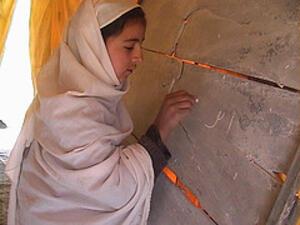In the Name of Allah: What a Young Afghani Woman Has Taught Me
Tell someone a story, and you don’t know what will happen next.
Last summer I was lucky to study at the Jewish Women’s Archive’s Institute for Educators. We spent five intense days learning the Living the Legacy curriculum with top scholars in social activism, Jewish feminism and history. In the coming months, I will be using Living the Legacy to teach a series of social justice workshops to teens in western Massachusetts.
But something else happened because of what I learned at the Jewish Women’s Archive.
I work nights as an editor at a daily newspaper. I’ve been doing it for 12 years. I was in the newsroom on Sept. 11, 2001, and I remember the night in October of that year when our government sent troops into Afghanistan. Because of this work, I have to read daily news out of Afghanistan and I’ve learned about the efforts of women to rebuild their lives and their country after, and in spite of, the Taliban. With this information, comes the weight of responsibility, but I have felt painfully powerless. I come home at night to look at my daughter sleeping and sometimes think: It is only an accident where we are born.
I was happy for the break when I went to the Institute this summer, and it was there that I learned of the kosher meat boycott on the Lower East Side in 1902.
This is a story of women using their social strength to hang on to their culture, because they felt it was necessary. It was exciting to me, this pain-in-the-ass organizing and striking for the right to remain Jewish, to keep a Jewish home, across the spectrum of religious observance. It occurred to me that this wasn’t only a Jewish story, but an example of how women build strength and power within their own cultures.
If you like this post, you'll enjoy other Human Rights related articles:
On Facebook one day, I told the story of the kosher meat boycott to a friend. She’s an international lawyer, who was working on law reform in Afghanistan, and volunteering for a school there. Within seconds she sent me a message and invited me to give a guest lecture for SOLA—School of Leadership Afghanistan—then she asked me to consider being a mentor/tutor for one of the students. It all happened just like that, on Facebook. I said yes.
In a few weeks, I was introduced to a young woman. We had our first emails, then our first Skype call. She was very polite and determined. Within minutes I realized she was interviewing me: Why did I want to be a tutor? What was my interest in Afghanistan? I know now she has no time to waste. I was lucky; she agreed to work with me.
It has been several months, and we work together nearly every day. Sometimes the Internet connection is good and we can see each other, sometimes we have only the sound of our voices. We are reading “To Kill a Mockingbird.” I help her with vocabulary, grammar and cultural context. She works very hard, staying up late to study and then rising early to read more. When she yawns, I yawn, and this always makes us laugh. Once, she told me, “You must always say ‘yes’ when your daughter wants to buy polish,” as she held up her fingers so I could see her nails. She is a teenager and full of life.
When the Taliban controlled Afghanistan, only 5,000 girls were studying in secret. Now, nearly 3 million girls are going to school. Still, girls are risking their lives every day to get an education. The day after Malala Yousafzai was attacked, I asked my student if she had heard of this girl in Pakistan who was shot by the Taliban. “No,” she said, “I have not had any time to watch the news. I have been studying all the time.”
She likes to say a blessing before she reads aloud to me. “In the name of Allah.” It reminds me of the bracha Jews say before studying Torah. It seems only fitting: An education is something worth risking your life for. We smile at each other across 6,000 miles. We are both grateful.
In learning and teaching the stories from the Jewish Women’s Archive, we make a commitment that runs in two directions: To the women who came before, you will not be forgotten; to the girls of the future, we are working for a better life, and we will save these stories for you, because they are yours.
The news about girls in Afghanistan is filled with hope and danger. Women frequently suffer domestic violence and rape, and there is a high rate of suicide. At the same time, girls there are so determined to get an education that they are speaking three languages and studying nonstop and encouraging each other. My student and I discuss these things openly. “I will tell you these stories,” she says, “because everyone must know.”








Thank you,Sam.
What an inspirational story from both sides. May God bless you both in your continued studies together, and may the knowledge you share help bring peace to the world.
In reply to <p>What an inspirational by Rabbi Janie Grackin
I agree - what a wonderful story.....reminds me of a movie that I saw recently about two young women who lived in Brooklyn, NY and met while they were student teaching in a public school - one Orthodox, one observant Muslim -- they created a beautiful friendship without ever compromising the essence of their respective faiths which in turn strengthened their lives. I hope this effort continues and continues -- it fills me with hope.
Samantha's story is the true example of the Jewish concept of "tikun olam - repairing the world." If we have to start someplace, what better place than with the suppressed women of Afghanistan. In no small way, they represent the future of that country and their tireless efforts to achieve recognition within the society of this war torn country is one of courage and determination in the face of great obstacles. Every effort to help them achieve their goals is a building block in raising their country to become a responsible member of the community of nations.
Sam, you are wonderful and your student is wonderful. It makes the heart full to know what good connections can be formed across miles, across generations, and across religions when we make the effort. You inspire so many people to try harder.
I couldn't stop my tears reading this story knowing that two of my nieces are in the program.
Well done! I can't wait to see Afghan women become empowered and stand for themselves.
Thank you!
In reply to <p>I couldn't stop my tears by Anonymous
Thank you very much! The girls and women of Afghanistan are so strong, they are a good example to all of us of what can be accomplished in a difficult time. I believe they will be among the top world leaders because of what they are doing. I am lucky to be part of this effort, and your nieces are so lucky to have your support. Sending you my best wishes. -Samantha Wood
In reply to <p>I couldn't stop my tears by Anonymous
There is so much to learn from each other and the wonderful thing is you are taking action on what you learned about another woman's needs. There is a very very good book by Dr Paul Farmer: Pathologies of Power. He also wrote "Mountains Beyond Mountains." He is a doctor and anthropologist who spent a lot of time working in Haiti and other very poor indigenous areas. He stresses how human rights impacts diseases and most of all, how it is the very poor who suffer and die from treatable diseases in Haiti, etc. I think you would find his writing poetically stark and right to the heart of how power in a few renders significant suffering in the destitute.